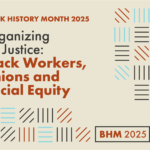More women in Canada are working than ever before: 70% of working women have children under five. Child care gives women the opportunity to pursue our dreams – to get a decent job, support our families and build a career, to further our education or skills training, and beyond. Child care is recognized internationally as fundamental to women’s equality, as good for child development, as a means of giving everyone a fair start in life regardless of income or social backgrounds.
How can we make good, affordable child care options available to everyone?
- Demand that the federal government work with the provinces and territories to make the vision of a national child care system a reality.
- Ensure that child care services are flexible, universal, affordable, public or non-profit and high quality.
- Stop the proliferation of “big box” private child care in Canada.
- Advocate for other public services and programs and negotiate workplace supports to help women balance work and family responsibilities.
Despite all this, access to quality, affordable child care remains a serious problem across Canada. Too many families struggle to find decent child care and scramble to piece together care they can afford.
For many families, child care is the second highest expense after housing. And if you have more than one child, child care fees can exceed mortgage payments or rents. But that’s only a problem if you can find a space.
Currently:
- There are only enough regulated child care spaces for about 20% of kids under five.
- Spaces for infants and toddlers, children with disabilities, Aboriginal, and rural children are even tougher to find.
- Waiting lists are often so long (20,000 in Toronto on any given day) that many families will never reach the top.
This issue goes way beyond moms in the workforce – women who don’t qualify for Employment Insurance (EI) lack access to paid maternity or parental leave. Meanwhile, women still do the majority of unpaid work in Canada, from domestic chores to caregiving. It doesn’t have to be this way.
Why doesn’t Canada have a child care system?
By 2005, experts and advocates had finally persuaded the federal government to create child care agreements with the provinces and territories. While not perfect, it was considered a major victory.
In 2006, the Harper Conservatives cancelled those agreements. Then they introduced a taxable $100 monthly payment to parents of children under six (which barely covers 1.5 days of child care in many communities).
While some provinces have made progress in improving access to child care, only Quebec has implemented a systemwide approach to make child care affordable and accessible to everyone. Meanwhile, government have allowed for-profit child care to expand at an alarming rate, despite research showing that private child care – from small, individual centres to “big box” chains – is less likely to provide high quality care.
When child care is about profits, wages are low, staff turnover is high, and quality suffers.
What unions are doing
Unions have demanded leave to look after children when they are sick, better vacation time and other ways to balance work and family life. They have created employer-sponsored funds to help families pay for child care, and some have helped establish workplace child care centres. But without a real early education and child care system that ensures access and quality, child care will continue to be a matter
of luck — living in the right part of the country, having the money, getting on a long wait list at the right time, even having a baby at the right time.
Research has shown that Quebec’s investment in its $7 a day child care program has more than paid for itself through mothers’ annual income and consumption taxes. They increased the number of women in the workforce by 3.8 per cent, pumping an additional $5.2 billion into the Quebec economy and boosting the province’s Gross Domestic Product by 1.7 per cent. Quebec also offers extended, flexible
parental leave and five weeks designated for the other parent.
Other provinces and territories should take a page from the Quebec approach.
It’s time for the federal government to get serious about this. Women and their families need child care services that supports women and gives them options to help balance work and family life. We know that creating a child care system from which all Canadians can gain is possible, with well-formed policy and political will. That’s why unions are pushing politicians to put child care on the agenda.





